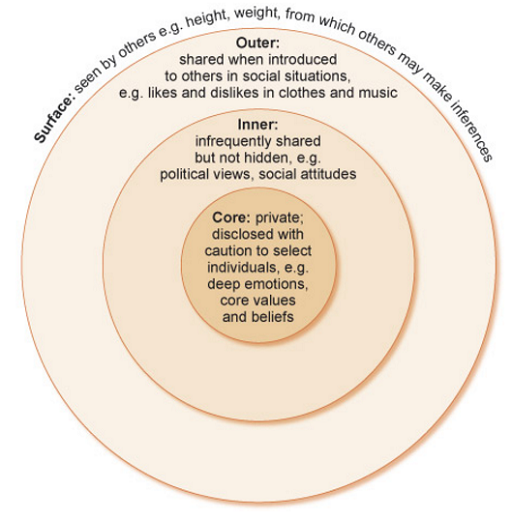5 How much of yourself should you reveal?
Sharing personal information can often help to enhance communication and relationships. For example, in The Smiling Gallery story (Activity 2) coach Jones deliberately finds out more about Pritch’s brother and sisters. Sharing aspects of ourselves encourages authenticity and honesty in communication (Rogers, 1980).
Other people have explained common-sense ideas of relationships developing over time through a process of self-disclosure (Bylund et al., 2012). This process is commonly described using an onion metaphor, to suggest the levels, or layers, of self-disclosure (see Figure 2). Often, only the outer surface layer is seen by others, as that is the identity we are comfortable presenting.
Activity 4 Appropriate sharing to facilitate connection
Think of a time when you (or a colleague) shared personal information in one-to-one conversation, or revealed information in a group or a workshop.
- What was the impact of this sharing?
- Do you consider it appropriate to talk about your own personal experiences with trusted work colleagues?
Discussion
Sharing personal experiences at work very much depends on the situation, your personality and your view of how appropriate you feel this is. In everyday social contexts, we seek out similarities to establish a common ground and build relationships that may open up communication further. Simple disclosures can help in this, such as mutual sporting interests or family experiences.
One person who completed this activity recalled that they had gradually learned about the benefit of disclosing a bit more of themselves at work and that this had become easier with age and experience; when they were in their twenties they said they were too concerned with managing impressions and not confident enough to reveal personal information.
Coaching, teaching, fitness training and management/leadership organisations each have their own professional standards, which attempt to clarify what is appropriate in terms of disclosure and professional relationships although these statements are often written in very general language. See Box 1 for an example.
Box 1 Two key principles of the Code of Practice for Sports Coaching
- Relationships: Coaches must develop a relationship with their participants (and others) based on openness, honesty, mutual trust and respect.
- Responsibilities (personal standards): Coaches must demonstrate proper personal behaviour and conduct at all times.

